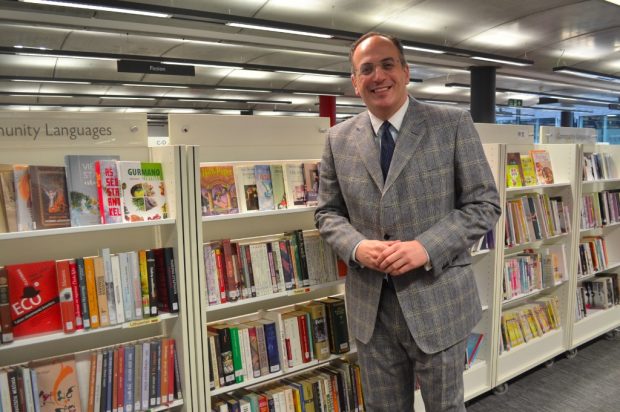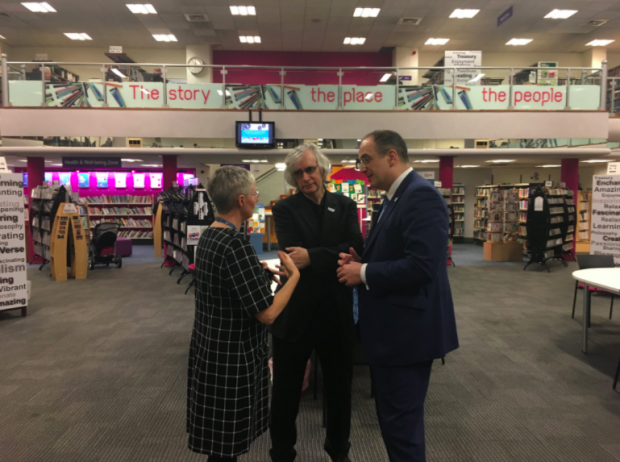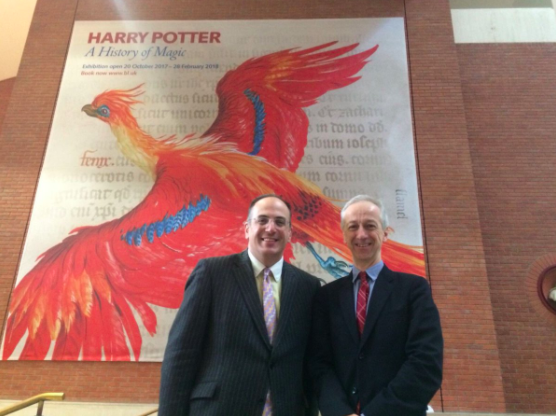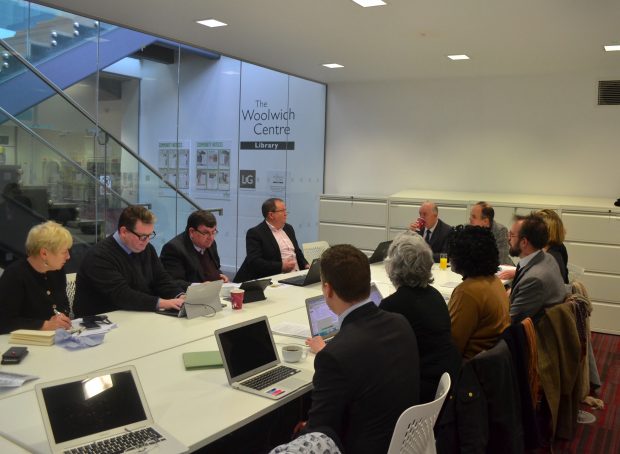[Editor's note: Michael Ellis MP, the new Parliamentary Under Secretary of State for Arts, Heritage and Tourism - and Libraries Minister - writes about libraries, and mentions libraries he has visited around the country since starting his role.]
Libraries are hugely important community resources. They help people discover books and a love of reading, as well as providing a large range of community activities, learning opportunities and free access to wifi and computers. Since becoming Minister for Arts, Heritage and Tourism a few weeks ago I have already had the chance to visit a number of superb public libraries across the country.

Supporting the sector
I’m proud of the way libraries help people to help themselves, bring people together, and provide practical support and guidance. I’m committed to getting that message across to people at all levels, whether in central government, councils or in other public services. I want all decision makers to understand the different ways that libraries can be used to support local communities.
For my part, I am supporting the Taskforce Team to promote the work of libraries across government. I’m pleased to see that libraries featured so strongly in the UK Digital Strategy, and want to improve the role of libraries in improving digital inclusion to make them the ‘go-to’ provider of digital access, training and support for local communities. The Taskforce is now represented on all the main delivery groups developing future plans on digital skills activity.
We will continue to put the case for the potential of libraries to deliver; recent examples are the major cross-governmental work being undertaken by my ministerial colleague, Tracey Crouch, to combat loneliness; the strong emphasis across government on improving support for those with mental health problems; work to combat the dangers presented by ‘fake news’; work to improve children’s internet safety; and the business support work that will be needed as part of the Industrial Strategy.
To put a case most effectively, we need robust evidence. We also need to reflect the wider and more varied role libraries play through the way we measure impact. The proposed contents of a new core dataset the Taskforce has published moves away from just measuring books and footfall to reflect a more comprehensive picture of the work that libraries do and the impact they have in communities.
My Department’s role in relation to libraries includes to superintend and promote the improvement of public library services provided by local authorities in England. I take this seriously, and we monitor library services to ensure that local authorities are compliant with their statutory duties. We are working with the Libraries Taskforce, Arts Council England and others to help libraries to prosper and to make sure that their important place in communities across the country is recognised.
Visiting libraries
I’ve already seen the great and varied work of libraries as I visit around the country as part of my role. I’ve been struck by the contribution the sector makes to local communities, and the positive impact libraries have on so many people’s lives.

In the past few weeks I’ve visited Abington library in Northampton, Coventry central library, and the British Library - all very different, but all contributing something special to those they serve. In Coventry, I was really impressed to see all the different activities that the library hosted - from language classes, and children’s events through to music concerts!

In the British Library, I was interested to learn about the work of the Business and IP Centre, and its role at the heart of a network of business advice centres in libraries around the country. I also heard about the immensely popular exhibition on the magic of Harry Potter - encouraging a new audience to visit the library and learn about the history of magic as well as providing the opportunity to read original chapters from the Harry Potter books.
Supporting the Libraries Taskforce
Libraries are an interesting and important part of my remit, and I was keen to meet with the Taskforce and its members as soon as I was appointed. Having already met separately with the Chair of the Taskforce, Kim Bromley-Derry, and the Chair and Chief Executive of Arts Council England, I was very pleased to be able to attend the Taskforce’s meeting on 7 February in Woolwich Centre library.

At Woolwich library I welcomed the chance to share my early thoughts and impressions, and to hear from other member organisations. We discussed how important it is for libraries to plan strategically, think about how they can meet the needs of the communities they serve most effectively, and how they can position themselves more effectively with other services. I've been very impressed by what the Taskforce has achieved since the Ambition strategy was published, and by the practical support, guidance and advocacy it’s already provided for the sector.
I will encourage individual Taskforce member organisations to take more of a lead on certain aspects of its work. I’m aware that Kathy Settle, who has been the Taskforce’s Chief Executive since its inception, and whose leadership. hard work and insights have been so valued by the sector, is stepping down at the end of March, and I thank her and wish her well. I’m confident that the rest of the Taskforce team, who’ll be led from April 2018 by Sheila Bennett (the current Policy lead), will continue to provide the excellent support and commitment to the Taskforce and the wider sector as they always have so far.
11 comments
Comment by Sue Anderson posted on
Nothing about central government ensuring local authorities have the funding to maintain their library services, that would be a conversation really worth having.
Comment by Laura Swaffield posted on
Both Coventry and Northants are slashing their library services! And, ironically, Mr Ellis is actually a Northants MP! I'm told he is a respected, hard-working constituency MP, & has visited quite a few libraries (by average MP standards) in the past.
Add to that the fact that the Northants chief executive, Paul Blantern, was Taskforce chair until he jumped ship ahead of the county's current spectacular financial meltdown - and NCC was lauded as an enthusiastic adopter of government/Taskforce approved 'innovations' such as outsourcing...
I fear the new minister is in danger of drowning in contradictions.
Comment by Martin Sawyer posted on
And, and..mr Ellis is actually the MP for Northampton north, the very constituency that Abington library is in and we are being shut down! Apart from s a visit and a few chats with the other conservative MP’s in the county we have received no support from him.
Comment by Elizabeth Bentley posted on
Not a word about the expertise of those who actually run libraries. After all, a room full of books without a librarian is just that, a room full of books. Organisation of knowledge for the benefit of those who are seeking knowledge of all kinds and for all reasons is at the heart of the profession. Encouraging literacy through reading for pleasure is also vital, and happens best when knowledgeable people work directly with individuals.
Comment by Debra Mcdonagh posted on
Agreed.
Regards,
School librarian, recenly made redundant
Comment by Lesley Martin posted on
No mention of the staff who make all this possible - qualified librarians and trained library workers. It doesnt all happen by magic. Yet our public library service is being deprofessionalised daily as councils appear to think any willing volunteer can run a library.
Comment by John Cagan posted on
Is the new Minister comfortable with the avalanche of local library closures, or the decimation of job positions for professional librarians? Because he doesn't mention this.
Comment by Larraine gooch posted on
No mention ofhis visiting community libraries, I suggest he does quickly.
Comment by David Johnston posted on
There seems little mention of revenue streams for libraries and making use of library technology to promote charging points for cars, community wellness e.g. yoga classes, art sales, further learning e.g. education through reading material and collections of online tests to encourage people to upskill, adult education etc.
Is this within the scope of the new Minister or are these services, which make libraries profitable, seen as outside his brief, since they involve offering services beyond traditional reading resources.
Comment by librariesmatter posted on
Welcome to your new responsibilities as Minister for Public Libraries.
Please could you:
- Adopt a much more robust approach, compared to your predecessors, in your decision letters to local councils. Councils are picking up on the fact that the DDCMS will allow any level of public library service as long as there is a nice self-justifying paper to support it. Current government policy is allowing a public library service ‘race to the bottom’. You need to address this. Having no national standards or meaningful national guidance doesn’t help.
- Organise the publication of timely public library service statistics. The DDCMS already pays for library profiles but they are hidden away - why? Why no national statistics? Why no trends over time? Why no meaningful analysis or commentary? Why does it take absurdly long to produce the statistics? Why is there no meaningful data in the DDCMS Annual Report on Public Libraries to Parliament? You should make providing core library service data a mandatory requirement for library authorities and consider ending the CIPFA private subscription model. The Libraries Taskforce is doing something on library performance but so far output has been scant.
Comment by Anna Smith posted on
Please look at what is happening to your own county of Northamptonshire.